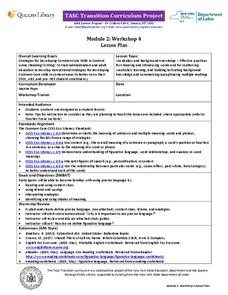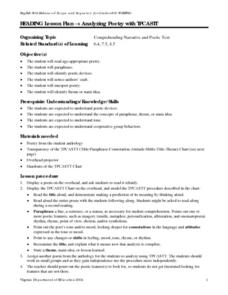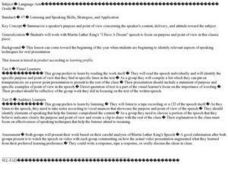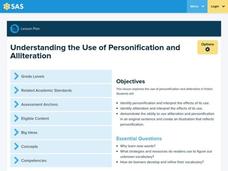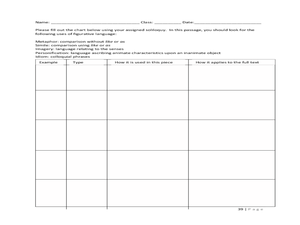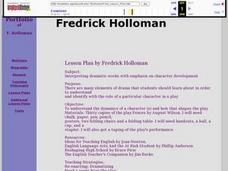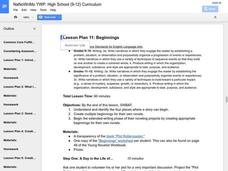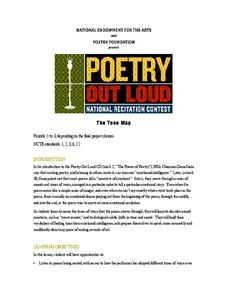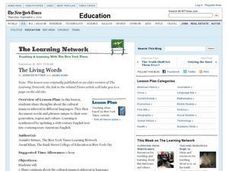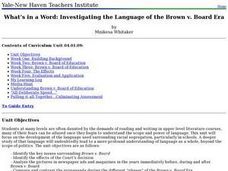EngageNY
Analyzing Images and Language: Inferring about the Natural Disaster in Eight Days
Pictures often reveal different meanings. Scholars analyze the images in Eight Days and discuss how they add meaning to the text. Readers answers questions about how specific colors are used to create different emotions. Learners then...
Curated OER
Figurative Language
Students create a PowerPoint show illustrating two types of figurative language. They demonstrate understanding of personification by creating and interpreting simple examples. They also demonstrate understanding of alliteration.
Curated OER
Effective Literary Analyses
Twelfth graders discuss a fictional text that they are given, they identify passages, which highlight the author's style, language naances and textual ambiguities. Pupils brainstorm possible topics for an analytical essay, they are...
New York State Education Department
TASC Transition Curriculum: Workshop 4
Why is it important to use precise language? Participants explore this question in the fourth activity in a series of 15 on effective instruction. Perfect for all content areas, the activity promotes appropriate language choice through...
Curated OER
Know Before You Go: Anticipating and Previewing Difficult Texts such as The Bluest Eye
Support your scholars with these anticipatory questions to go along with The Bluest Eye by Toni Morrison. The objective, rationale, and teacher instructions are clearly explained, followed by an anticipation guide for pages 81-93 and the...
National Endowment for the Humanities
Kate Chopin's The Awakening: Local Color in the Late 19th Century
Kate Chopin's The Awakening introduces readers not only to the lush Louisiana setting of Grand isle but also to the nuances of Creole culture. the second lesson in a three-part series examines how Chopin's use of literary realism and...
Curated OER
Close Reading
Eleventh graders read and study Hamlet. Then they are introduced to close reading as a means of understanding what is being read--not only understanding the printed word, but also the nuances and connotations of language as it is used by...
Curated OER
Analyzing Poetry with TPCASTT
Middle schoolers read a poem and complete a TPCASTT chart. They make a prediction about the title (T) , paraphrase each line (P), identify poetic devices and nuances (C-connotation), explore mood and tone (A-attitude), point out shifts...
Curated OER
Martin Luther King's "I Have a Dream"
Dr. Martin Luther King's "I Have a Dream" speech provides the text for a study of how to analyze a speaker’s content, delivery and attitude. Visual learners identify specific lines that reveal King’s purpose and point of view while...
Curated OER
Review of Personification and Alliteration
Students review personification and alliteration. In this literary devices lesson, students use personification and alliteration in a sentence. Students draw a picture reflecting personification.
Curated OER
A Gesture Is Worth a Thousand Words
Students share observations on the nuances of meaning in face to face and online interactions with others. After reading an article, they identify the causes and effects of internet flaming. They create their own comic strips...
Curated OER
Soliloquy Performances
Students investigate soliloquies. In this performing arts lesson, students discuss figurative language within soliloquies and then perform a soliloquy to the rest of the class.
Curated OER
Interpreting Dramatic Works
Action! Delve into character development in the play Fences by August Wilson, setting the stage for learners to analyze character nuances. Thespians choose a scene from the script, responding with a written account of the...
Curated OER
Persuasion as Text: Organizational, Grammatical, and Lexical Moves in Barbara Jordan’s "All Together Now"
A thorough lesson on persuasive writing takes middle schoolers through several activities, including group discussion, collaborative posters, and independent writing. They compare historical speeches and analyze the persuasive techniques...
Curated OER
Lesson Plan 11: Beginnings
Every good novel needs a solid beginning! Setting the stage can have your budding authors stumped, so use this activity to get them thinking. After examining the plot rollercoaster image (included) they consider the four places...
Curated OER
Lesson Plan 17: Novel, Take 2
It's all about using peer resources in this writing process lesson, which includes a fantastic novel revision worksheet packet. Learners have read a partner's story draft the night before, and groups have a "lightning round of...
Curated OER
The Tone Map
Poems are meant to be heard. Hearing a poem being read enriches one’s understanding of the tone and mood of the piece. Introduce your class to the sounds of poetry with a packet that not only details how to use poetry recordings in the...
Curated OER
The Living Words
Students translate a 16th century English text into contemporary English. They discuss the cultural uniqueness and significance of language and document words or phrases currently used in their daily lives. They use this list to aid in...
Curated OER
What's in a Word: Investigating the Language of the Brown v. Board Era
Young scholars focus on the development of the language used surrounding racial segregation, particularly in schools. They identify the key issues surrounding Brown v. Board and identify the effects of the Court's decision. They analyze...
Southern Nevada Regional Professional Development Program
“Just a Minute” Focus: Adapting Speech
A little bit complicated, but a whole lot of fun. Show your class an episode of the British television game show Just a Minute. After an explanation of the rules (no repetition, hesitation, or deviation) groups develop topics, based on...
Curated OER
Vocabulary Comic Strips
Who says comic strips aren’t educational? Prove these naysayers wrong by asking your class members to create a comic strip for a selected vocabulary word. Using online technological tools that provide access to an array of options for...
Curated OER
Idioms
Use this podcast lesson to familiarize scholars with the characteristics, history, and cultural implications of idioms. As part of the Walking Classroom curriculum, kids listen to a 12-minute podcast as they walk around campus. If you...
Alabama Learning Exchange
Phonics lesson for -ew and -oo
First graders identify letters and sounds associated with -ew and -oo sounds. Each learner receives a stack of cards containing these sounds, and they must determine whether the word uses the -ew or the -oo sound. This could easily...
Curated OER
Describe and Compare: Teacher Edition
Note: This is the teacher's guide to Pimsleur's French lesson called "Describe & Compare." The guide discusses the lesson's purpose, objectives, and designed learning outcomes. It presents information on each of the activities the...





